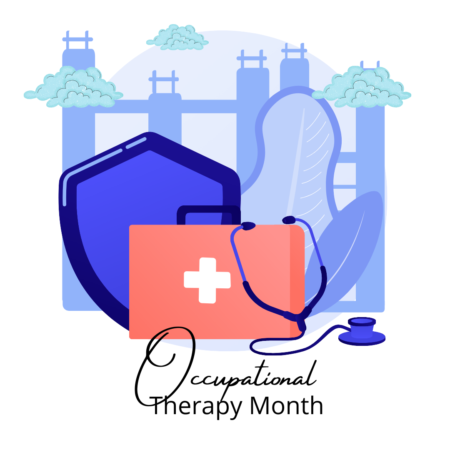 April is National Occupational Therapy Month, a time to recognize and celebrate the invaluable contributions of occupational therapists in helping individuals live life to the fullest. Occupational therapy (OT) plays a crucial role in improving daily living skills, promoting independence, and enhancing quality of life for people of all ages and abilities. From children with developmental delays to seniors recovering from injuries, occupational therapists empower individuals to overcome challenges and achieve their goals. In honor of National Occupational Therapy Month, let’s explore the importance of OT and showcase some innovative products that can aid in therapy sessions.
April is National Occupational Therapy Month, a time to recognize and celebrate the invaluable contributions of occupational therapists in helping individuals live life to the fullest. Occupational therapy (OT) plays a crucial role in improving daily living skills, promoting independence, and enhancing quality of life for people of all ages and abilities. From children with developmental delays to seniors recovering from injuries, occupational therapists empower individuals to overcome challenges and achieve their goals. In honor of National Occupational Therapy Month, let’s explore the importance of OT and showcase some innovative products that can aid in therapy sessions.
The Role of Occupational Therapy: Empowering Independence and Enhancing Well-being
Occupational therapy is a holistic and client-centered approach to healthcare that focuses on enabling individuals to participate in meaningful activities and occupations. Occupational therapists work with people of all ages and abilities to address physical, cognitive, sensory, and emotional challenges that may impact their daily functioning. By developing personalized treatment plans and using evidence-based interventions, occupational therapists help clients improve their:
- Self-care Skills: OT interventions target activities of daily living (ADLs) such as bathing, dressing, grooming, and feeding, helping individuals regain independence in self-care tasks.
- Mobility and Motor Skills: Occupational therapists address issues related to mobility, coordination, and fine motor skills, enabling clients to navigate their environments safely and effectively.
- Cognitive Abilities: OT interventions focus on enhancing cognitive functions such as attention, memory, problem-solving, and executive functioning, facilitating improved performance in school, work, and daily activities.
- Sensory Integration: For individuals with sensory processing difficulties, occupational therapists use sensory integration techniques to help regulate sensory input and improve participation in daily activities.
- Social Participation: Occupational therapists promote social skills, interpersonal communication, and community engagement, fostering meaningful relationships and connections.
Innovative Products for Occupational Therapy Sessions
In addition to personalized interventions and therapeutic techniques, occupational therapists often utilize innovative products and assistive devices to support their clients’ goals and facilitate progress in therapy sessions. Here are some examples of products commonly used in occupational therapy:
- Adaptive Equipment: Adaptive equipment such as dressing aids, reachers, and buttonhooks help individuals with limited mobility or dexterity perform daily tasks independently.
- Sensory Tools: Sensory tools like fidget toys, weighted blankets, and sensory brushes provide sensory input and promote self-regulation for individuals with sensory processing difficulties.
- Assistive Technology: Assistive technology devices such as adaptive keyboards, voice recognition software, and specialized computer interfaces enable individuals with disabilities to access and interact with technology more effectively.
- Therapeutic Toys and Games: Therapeutic toys, puzzles, and games are used to facilitate skill development, promote cognitive engagement, and encourage social interaction during therapy sessions.
- Home Modifications: Occupational therapists may recommend home modifications such as grab bars, shower benches, and wheelchair ramps to improve accessibility and safety within the home environment.
National Occupational Therapy Month is an opportunity to recognize and honor the dedicated occupational therapists who make a positive difference in the lives of individuals and families every day. By empowering independence, promoting participation, and fostering well-being, occupational therapy transforms challenges into opportunities for growth and achievement. As we celebrate OT Month, let us also acknowledge the importance of innovative products and assistive devices that enhance therapy sessions and support clients on their journey to greater independence and fulfillment. Together, let’s continue to champion the transformative power of occupational therapy and its profound impact on individuals, communities, and society as a whole
